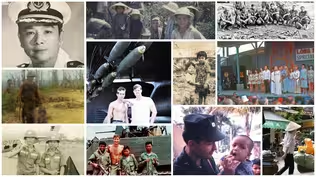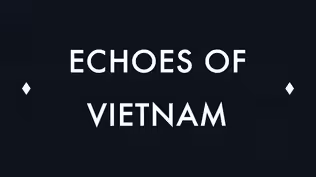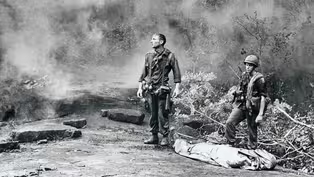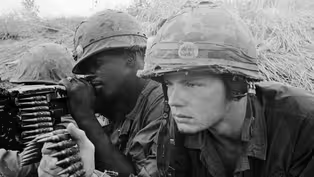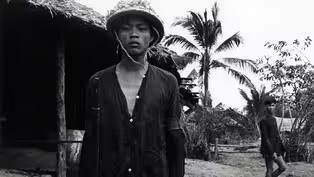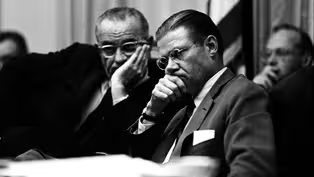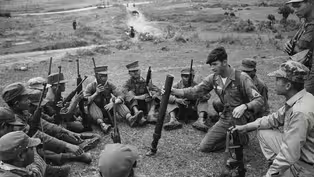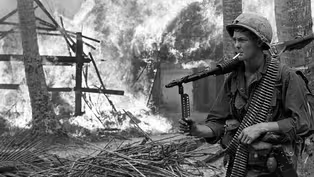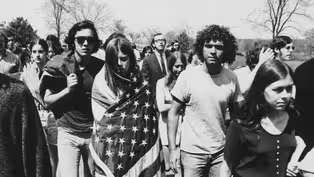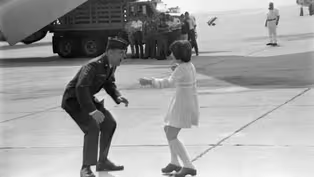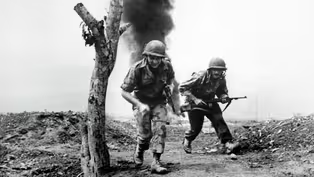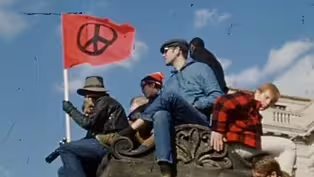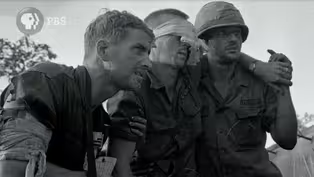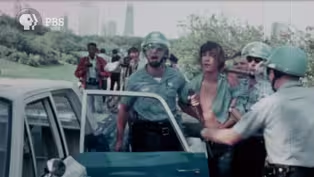
The Veneer of Civilization (June 1968-May 1969)
Episode 7 | 1h 50m 54sVideo has Audio Description
After chaos roils the Democratic Convention, Nixon, promising peace, wins the presidency.
Public support for the war declines, and American men of draft age face difficult decisions and wrenching moral choices. After police battle with demonstrators in the streets of Chicago, Richard Nixon wins the presidency, promising law and order at home and peace overseas. In Vietnam, the war goes on and soldiers on all sides witness terrible savagery and unflinching courage.
See all videos with Audio DescriptionADProblems playing video? | Closed Captioning Feedback
Problems playing video? | Closed Captioning Feedback
Funding for The Vietnam War is provided by Bank of America; Corporation for Public Broadcasting; David H. Koch; The Blavatnik Family Foundation; Park Foundation; The Arthur Vining Davis Foundations; The...

The Veneer of Civilization (June 1968-May 1969)
Episode 7 | 1h 50m 54sVideo has Audio Description
Public support for the war declines, and American men of draft age face difficult decisions and wrenching moral choices. After police battle with demonstrators in the streets of Chicago, Richard Nixon wins the presidency, promising law and order at home and peace overseas. In Vietnam, the war goes on and soldiers on all sides witness terrible savagery and unflinching courage.
See all videos with Audio DescriptionADProblems playing video? | Closed Captioning Feedback
How to Watch The Vietnam War
The Vietnam War is available to stream on pbs.org and the free PBS App, available on iPhone, Apple TV, Android TV, Android smartphones, Amazon Fire TV, Amazon Fire Tablet, Roku, Samsung Smart TV, and Vizio.
Buy Now
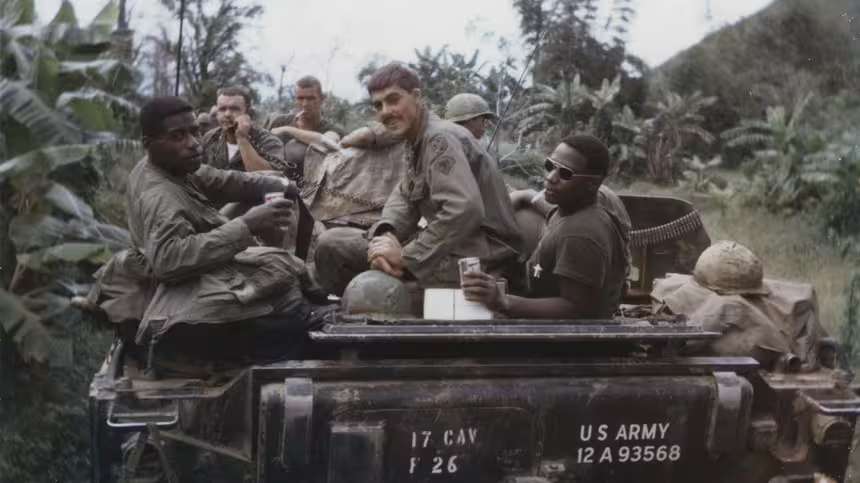
Vietnam Stories
We asked viewers to share their experiences during the events of the Vietnam War era. The response was thousands of videos, photographs, and short stories.Providing Support for PBS.org
Learn Moreabout PBS online sponsorshipMore from This Collection
These episodes feature audio tracks containing English, Spanish and Descriptive Audio.
The Weight of Memory (March 1973-Onward)
Video has Audio Description
Saigon falls and the war ends. Americans & Vietnamese from all sides seek reconciliation. (1h 50m 56s)
This Is What We Do (July 1967-December 1967)
Video has Audio Description
President Johnson escalates the war while promising the public that victory is in sight. (1h 28m 17s)
Things Fall Apart (January 1968-July 1968)
Video has Audio Description
Shaken by the Tet Offensive, assassinations and unrest, America seems to be coming apart. (1h 27m 46s)
The River Styx (January 1964-December 1965)
Video has Audio Description
With South Vietnam near collapse, LBJ bombs the North and sends US troops to the South. (1h 57m 55s)
Video has Audio Description
As a communist insurgency gains strength, JFK wrestles with US involvement in Vietnam. (1h 26m 27s)
Resolve (January 1966-June 1967)
Video has Audio Description
US soldiers discover Vietnam is unlike their fathers’ war, as the antiwar movement grows. (1h 57m 25s)
The History of the World (April 1969-May 1970)
Video has Audio Description
Nixon withdraws troops but upon sending forces to Cambodia the antiwar movement reignites. (1h 52m 9s)
A Disrespectful Loyalty (May 1970-March 1973)
Video has Audio Description
South Vietnam fights alone as Nixon and Kissinger find a way out for America. POWs return. (1h 52m 32s)
Video has Audio Description
After a century of French occupation, Vietnam emerges independent but divided. (1h 25m 20s)
Providing Support for PBS.org
Learn Moreabout PBS online sponsorshipANNOUNCER: MAJOR SUPPORT FOR "THE VIETNAM WAR" WAS PROVIDED BY MEMBERS OF THE BETTER ANGELS SOCIETY, INCLUDING JONATHAN AND JEANNIE LAVINE, DIANE AND HAL BRIERLEY, AMY AND DAVID ABRAMS, JOHN AND CATHERINE DEBS, THE FULLERTON FAMILY CHARITABLE FUND, THE MONTRONE FAMILY, LYNDA AND STEWART RESNICK, THE PERRY AND DONNA GOLKIN FAMILY FOUNDATION, THE LYNCH FOUNDATION, THE ROGER AND ROSEMARY ENRICO FOUNDATION, AND BY THESE ADDITIONAL FUNDERS.
MAJOR FUNDING WAS ALSO PROVIDED BY DAVID H. KOCH...
THE BLAVATNIK FAMILY FOUNDATION...
THE PARK FOUNDATION, THE NATIONAL ENDOWMENT FOR THE HUMANITIES, THE PEW CHARITABLE TRUSTS, THE JOHN S. AND JAMES L. KNIGHT FOUNDATION, THE ANDREW W. MELLON FOUNDATION, THE ARTHUR VINING DAVIS FOUNDATIONS, THE FORD FOUNDATION JUSTFILMS, BY THE CORPORATION FOR PUBLIC BROADCASTING, AND BY VIEWERS LIKE YOU.
THANK YOU.
Announcer: Can looking back push us forward?
Man: Ladies and gentlemen, Miss Billie Holiday.
♪ Will our voice be heard through time?
Can our past inspire our future?
...act of concern... ♪ Bank of America supports filmmakers like Ken Burns, whose narratives illuminate new perspectives.
What would you like the power to do?
Bank of America.
(people cheering, turkeys gobbling) ("Blues Run the Game" by Simon and Garfunkel playing) ♪ Catch a boat to England, baby, maybe to Spain ♪ ♪ Wherever I have gone ♪ ♪ Wherever I've been and gone ♪ ♪ Wherever I have gone the blues run the game.
♪ TIM O'BRIEN: I grew up in a small farming community in southern Minnesota called Worthington.
Small-town America-- at least my small town-- had great virtues.
It was a safe place to grow up.
There was Little League baseball in the summer, and there was hockey in the winter.
SIMON AND GARFUNKEL: ♪ When I ain't drinkin', baby, you are on my mind.
♪ O'BRIEN: Everybody knows everyone else's business and their faults and what's happening in their marriages and where the kids have gone wrong.
It was full of the Kiwanis boys and the Elks Club and the country club set and the kind of chatty housewives and the holier-than-thou ministers.
SIMON AND GARFUNKEL: ♪ Wherever I've been and gone... ♪ O'BRIEN: I remember the day my draft notice arrived.
It was a summer afternoon, maybe June of '68.
And I remember taking that envelope into the house and putting it on the kitchen table where my mom and dad were having lunch.
And they didn't even read it.
They just looked at it and knew what it was.
And the silence of that lunch-- I didn't speak, my mom didn't speak, my dad didn't speak-- was just that piece of paper lying at the center of the table.
It was enough to make me cry to this day, not for myself, but for my mom and dad, who both of them had been in the Navy during World War II, had believed in service to one's country and all those values.
HOWARD TUCKNER: ...considers all civilians potential enemies... O'BRIEN: On the one hand I did think the war was less than righteous.
On the other hand I love my country.
And I valued my life in a small town and my friends and family.
And so the summer of '68, I wrestled with what to do, was for me, at least, more torturous and devastating and emotionally painful than anything that happened in Vietnam.
In the end I just capitulated.
And one day I got on a bus with other recent graduates, and we went over to Sioux Falls about 60 miles away, and raised our hands and got in the Army.
But it wasn't a decision, it was a forfeiture of a decision.
It was letting my body go, turning a switch in my conscience, just turning it off, so it wouldn't be barking at me saying, "You're doing a bad and evil and stupid and unpatriotic thing."
Last week's casualty figures in the Vietnam War released today showed 299 Americans killed, the lowest figure in two months.
("Revolution 1" by the Beatles playing) (music continues, crowd shouting) ♪ You say you want a revolution ♪ ♪ Well, you know ♪ ♪ We all want to change the world ♪ ♪ You tell me that it's evolution ♪ ♪ Well, you know ♪ ♪ We all want to change the world ♪ ♪ But when you talk about destruction ♪ ♪ Don't you know that you can count me out, in ♪ ♪ Don't you know it's gonna be all right ♪ NARRATOR: By June of 1968, the spirit of revolution-- over the Vietnam War, over injustice, over human rights-- seemed to have spread everywhere.
The pressure to bring an end to the war was building.
President Lyndon Johnson had already decided not to run again, assassinations and unrest had staggered the nation, and the country was preparing to choose a new president.
Meanwhile, American and North Vietnamese diplomats in Paris were getting nowhere.
The communists insisted there could be no substantive negotiations until the United States stopped all bombing of North Vietnam.
LENNON: ♪ With minds that hate... ♪ NARRATOR: The new secretary of defense, Clark Clifford, who had turned from hawk to dove after just a few months in office, begged the president to call a total halt.
"We can only hope for success at the bargaining table," he told Johnson.
"We are in a war we cannot win."
The president refused to stop the bombing.
Over the following months, there would be reports of progress on the battlefield and in the countryside.
But that progress came so slowly and at so high a cost in human lives that the war against the war intensified back home, pitting classes and generations against one another, spreading distrust of political leaders who seemed unable or unwilling to bring the fighting to an end.
Young men from all over the country would continue to face questions and choices their fathers and grandfathers had rarely had to face when asked to fight in other wars: What obligation did a citizen owe his country?
What should one do when asked to fight a war in which one did not believe?
How was a soldier to distinguish between a shadowy enemy and the Vietnamese civilians he was supposed to be defending?
LENNON: ♪ Shoo-bee-do-wop ♪ ♪ Oh, oh, oh, oh.
♪ NARRATOR: The coming summer of 1968 would be one of the most consequential in American history.
LENNON: ♪ All right, all right, all right, all right, all right ♪ ♪ All right, all right ♪ ♪ Shoo-bee-do-wop ♪ (song fades out) Earlier this year, top U.S. leaders vowed that the U.S. Marine outpost at Khe Sanh, then under a 77-day enemy siege, would be defended at all cost.
(jet engine roars) (explosion) MAX CLELAND: Johnson had said in the fall of '67, and as we went into '68, "I don't want no damn Dien Bien Phu."
So the whole American military, from the Joint Chiefs on down, whether they believed in saving Khe Sanh or not, were hell-bent for leather to make damn sure the siege was broken.
Now the telltale moment of that is that a week after the siege was broken, they plowed the base under and abandoned it.
That was Vietnam in a microcosm.
(helicopter blades whirring) NARRATOR: There was a new commander in Vietnam now, General Creighton W. Abrams, a hero of World War II, a soldier's soldier, one reporter said, who "could inspire aggressiveness in a begonia."
LEWIS SORLEY: Some newsman once described him as looking like an unmade bed smoking a cigar.
He's gruff.
He drank a lot.
He's grumpy in the morning.
Sometimes staff officers would schedule appointments with him in the morning for, with generals who were causing him trouble.
NARRATOR: Abrams was a welcome new face for the American war.
Reporters found him more frank and open than his predecessor.
"The overall public affairs policy of this command," he told his subordinates, "will be to let results speak for themselves."
"Occasionally," one officer said, "we are allowed to state frankly that we didn't do a damn thing this month."
Many soldiers would believe for the rest of their lives that if Abrams had taken command sooner, the outcome could have been different.
VINCENT OKAMOTO: You're told very succinctly, "We need to rack up as much body count as we can.
How many gooks did you kill today?"
And it was the kill ratio that determined whether or not you called it a victory or a loss.
So if you killed 20 North Vietnamese and lost only two people, they declared a great victory for that particular firefight.
NARRATOR: Lieutenant Vincent Okamoto was born during World War II in a Japanese-American internment camp at Poston, Arizona, the seventh son of Japanese immigrants.
All six of his brothers had served in uniform-- two fought with the celebrated 442nd Regimental Combat Team in Italy and France, the most highly decorated unit of that war-- and so, when Okamoto's country went to war in Vietnam, he believed he should go, too.
He was now a platoon leader with Bravo Company, 2nd Battalion, 27th Regiment, 25th Infantry Division, based at Cu Chi, some 20 miles northwest of Saigon, an area honeycombed with miles of Viet Cong tunnels.
OKAMOTO: My parents are Japanese immigrants.
I had rice literally every day of my life until I went into the military.
So we were conducting a cordon and search of a village.
Didn't find any weapons, didn't find any communist literature or whatever.
So we took a prolonged lunch break.
Everybody wants to get out of the sun.
Well, my RTO, my medic and I went into this particular house, and there was... there were three women, and a babe in arms, and a kid about four years old.
And she was cooking... rice.
Well, here, here's Okamoto, Mrs. Okamoto's son, that hadn't had rice now-- hot, steamed rice-- for months.
I'm looking at it, it looks pretty good to me.
So I-I get my interpreter.
I said, "Hey, tell this woman, the grandma, "that I'll give her a pack of cigarettes, "my C-ration turkey loaf, and a can of peaches for some of that steamed rice and that fish and vegetables."
It was great.
And I asked for seconds.
My RTO says, "Damn, ain't these people poor enough without you eating their food?"
I said, "You know, hell, they got enough rice here to feed a dozen men."
And then, it just dawned, they did have enough rice to feed a dozen men.
So I had my interpreter ask the woman, "Who's all this rice for?"
(speaking Vietnamese) "I don't know, I don't know."
So we started looking around again.
We found a tunnel mouth.
I was given a grenade.
After the smoke cleared, we pulled, I think, seven or eight bodies to the town square.
And we wanted to see who would cry over these people.
And then we'd have more people to question.
The women that lived in that house, and I had eaten their rice, they're all squatting down, wailing.
And you couldn't identify these, these... they're just charred bodies.
Um... And I think that was the first time I knew that I personally had killed people.
I got an "Attaboy" from the supervisor.
But, uh... it wasn't something that you can say had glory in it, or you felt a real sense of accomplishment.
NARRATOR: Over that summer, Okamoto was wounded two times and made 22 helicopter assaults, four of them as commander of Bravo Company.
On the morning of August 23, he made his 23rd assault.
Nineteen helicopters ferried the first and second platoons to a new landing zone near Cambodia.
Their task was to dig in, stay put, and somehow block a battalion of North Vietnamese troops, who were trying to escape across the border.
Okamoto's unit was reinforced by a platoon of mechanized infantry, three APCs, and a tank, but they were still badly outnumbered.
He and the fewer than 150 men under his command spent the rest of that day and all of the next preparing as best they could for an attack, setting Claymore mines and hanging three coils of razor wire.
OKAMOTO: August the 24th, about 10:00 that night, we got hit with a very heavy mortar barrage.
(shouting, explosions) Within the first, I would say, ten seconds, all three of those armored personnel carriers and tanks were knocked out with rocket-propelled grenades.
NARRATOR: Trip flares briefly lit up the landscape.
Scores of enemy troops were running at them through the elephant grass.
(gunfire) VC mortar shells blasted two gaps in the razor wire.
If Okamoto and his outnumbered men couldn't plug them, they were sure to be overrun.
He and the four men closest to him held their M-16s above their heads and fired blindly.
The enemy kept coming.
OKAMOTO: I had my four people.
And through the light of the flares, I said, "A couple you guys go and man the machine guns out on those APCs."
Well, the response I got was, like, uh... "... you, I ain't going up there."
So I ran to the first armored personnel carrier, and I... pulled the, the gunner out of the turret, dead.
I jumped in there, manned the machine gun, and fired until it ran out of ammo.
NARRATOR: Okamoto moved to the second disabled APC and then the third, emptying their guns.
OKAMOTO: And they were still coming at us.
So I crawled out there, till I was about ten meters from 'em.
And I killed 'em with hand grenades.
NARRATOR: Two enemy grenades fell near him and he managed to throw both back.
But a third landed just beyond his reach.
Shrapnel fragments peppered his legs and back.
OKAMOTO: I just knew for sure I was going to die.
"Okamoto, you're not going to make it out of here.
"Mom's going to take it hard, but, you know, you're not going to make it out of here."
And that's liberating.
When you know you're going to die, you don't... the fear leaves.
At least in my case, I was no longer afraid.
I was just mad because here are all these little guys trying to kill my ass.
And if that's the case, then I'm going to make it as tough on them as I possibly can before I go down.
I killed a lot of brave men that night.
And I rationalized that by telling myself, "Well, maybe what you did-- just maybe-- saved the lives of a couple of your people."
NARRATOR: During the night, the enemy had slipped into Cambodia, dragging as many of their dead with them as they could.
A third of Okamoto's company had been lost.
("The Lord Is in This Place" by Fairport Convention playing) For his efforts that day, Vincent Okamoto received the Distinguished Service Cross, the Army's second highest honor.
Before his tour of duty ended, he would become the most highly decorated Japanese-American to survive the Vietnam War.
OKAMOTO: You know what?
(sighs) The real heroes are the men that died.
19-, 20-year-old high school dropouts.
They didn't have escape routes that the elite and the wealthy and the privileged had.
And that was unfair.
And so they looked upon military service as... (sighs) ...like the weather.
You had to go in, and you'd do it.
But to see these kids, who had the least to gain, there wasn't anything to look forward to; they weren't going to be rewarded for their service in Vietnam.
And yet their infinite patience, their loyalty to each other, their courage under fire was just phenomenal.
And you would ask yourself, "How does America produce young men like this?"
HUY DUC: NARRATOR: At first, Radio Hanoi had portrayed the Tet Offensive as a series of "tremendous victories" in which "hundreds of thousands of people have risen up and destroyed enemy positions."
"But after a couple of weeks," one North Vietnamese remembered, "we didn't hear any more news.
"The Saigon regime was still there "and the U.S. planes were still bombing.
It was obvious the radio wasn't telling the truth."
Casualty figures were never revealed, but to North Vietnamese citizens secretly listening to reports on the BBC and Radio Saigon, it was clear that they had been heavy.
PHAM LUC: HUY DUC: NARRATOR: In late August 1968, Le Duan and the North Vietnamese leadership launched still another offensive.
The result was the same as Tet and Mini-Tet.
They lost 17,000 more men.
Thousands of fresh recruits had to be ordered south to replace them.
"The war began to seem like an open pit," one North Vietnamese remembered.
"The more young people were lost there, the more they sent."
The sons of some party officials and their friends were sent abroad to escape the draft.
University students were exempted.
People with money bribed recruiters to overlook their offspring or paid physicians to declare them unfit to serve.
HUY DUC: NARRATOR: Most draftees were poor people from the countryside, especially receptive to the slogans and promises of the revolution.
Thousands of replacements made their way down the Ho Chi Minh Trail past burned-out vehicles and military graveyards, the stones neatly marked with the names of the dead and the date each had died.
They encountered small groups of wounded men moving in the other direction.
Those without arms walked.
Legless men rode in camouflaged trucks.
There were blinded soldiers and others who had been hideously burned by napalm.
"You'll see all kinds of pleasures in the South," the weary wounded told the young men moving toward the war.
"Everyone was frightened," a political officer remembered, "especially when we met those men.
It was like looking at our future selves."
The youngest delegate of the New Jersey delegation casts his vote for the next president of the United States, Richard Nixon.
We've got 18.
David, we doubled it, 18.
NARRATOR: Richard Nixon had been a prominent and controversial figure in American politics for more than two decades.
He'd been a congressman and senator, best known for his fierce anticommunism, then served eight years as Dwight Eisenhower's vice president.
He narrowly lost the presidential race to John Kennedy in 1960 and was defeated again two years later trying to become governor of California.
His career seemed to be over.
But then, in one of the most extraordinary comebacks in U.S. political history, he had outsmarted and out-maneuvered and out-campaigned his rivals to win the 1968 Republican nomination.
MAN: Richard M. Nixon... (cheering and applause) His pick for vice president was the tough-talking but largely unknown governor of Maryland, Spiro Agnew.
Nixon made the case for himself as the man who could bring a fractured America together and bring an honorable end to the war.
When the strongest nation in the world can be tied down for four years in a war in Vietnam with no end in sight; when the richest nation in the world can't manage its own economy; when the nation with the greatest tradition of the rule of law is plagued by unprecedented lawlessness; when a nation that has been known for a century for equality of opportunity is torn by unprecedented racial violence; and when the president of the United States cannot travel abroad or to any major city at home without fear of a hostile demonstration, then it's time for new leadership for the United States of America.
(cheering) Good evening from Chicago, where the 35th National Democratic Convention opens tomorrow with the promise of turmoil inside this hall and a threat of violence without.
JOHN LAURENCE: Both sides moved in their troops on a balmy Sunday morning for the confrontation of Chicago.
Some 6,000 crack Army troops, riot trained and ready for action...
The Army soldiers moved out to secret locations around the city after one of the largest troop movements in domestic history.
NARRATOR: Some 15,000 protestors had gathered in Chicago, most to register their anguish over the war... ...some bent on disrupting the convention.
Richard J. Daley, the Democratic mayor of Chicago, was determined that there be no trouble in his city.
Twelve thousand Chicago policemen were on alert.
In addition to the 6,000 U.S. Army troops, there were 6,000 more armed National Guardsmen and a thousand intelligence agents from the FBI, the CIA, and the military.
Mayor Daley cordoned off the Chicago Amphitheater where the convention was being held and denied the protestors permits to march or to sleep in the city's parks.
INTERVIEWER: Are you planning to go without the permit if you don't get the permit?
RENNIE DAVIS: Given the fact that for many months we have notified this city and this nation that we wish to hold a demonstration, an assembly in Chicago to register our convictions about the war, the tens of thousands of people coming to the city of Chicago constitute a permit.
Our fight is with the militarism that is developing in this country in the response to legitimate political and social grievances by bringing in troops rather than dealing with the real issues and real problems.
CRONKITE: In the name of security, freedom of the press, freedom of movement, perhaps as far as the demonstrators themselves are concerned, even freedom of speech have been severely restricted here.
A Democratic convention is about to begin in a police state.
There just doesn't seem to be any other way to say it.
JOHN BAILEY: Will the delegates please be seated.
NARRATOR: Vice President Hubert Humphrey, President Johnson's chosen successor, was the frontrunner.
He had always been a hero to his party's liberal wing, but because he had loyally supported the president and the war, many delegates, and most of the demonstrators outside the convention hall, backed his antiwar rival, Senator Eugene McCarthy.
(muffled shouting on megaphone) On the second night of the convention, the police drove hundreds of demonstrators out of Lincoln Park with clubs and tear gas.
(sirens wailing) JOHN CHANCELLOR: The delegates wearing bands of black crepe on their arms... NARRATOR: The next afternoon, the Democrats heatedly debated a plank in the party platform calling for an end to the war.
When Humphrey supporters voted it down, the antiwar delegates erupted.
CHANCELLOR: ...who have joined New York in this extraordinary demonstration of antiwar sentiment on the convention floor.
("Street Fighting Man" by the Rolling Stones playing) DOUGLAS KIKER (on TV): The demonstrators resisted when police attempted to arrest a young man who tried to rip down an American flag.
PROTESTOR: Watch... watch these ... Don't turn your back on these ...!
MICK JAGGER: ♪ Everywhere I hear the sound of marching... ♪ PHILIP CAPUTO: The cops were all... they were guys from the neighborhoods-- Italians, Polish guys, Irish guys.
Probably some of them had been in Vietnam.
And if they hadn't been, they certainly had cousins or brothers who were.
NARRATOR: Philip Caputo, who had fought with the Marines in Vietnam, was now a reporter, assigned to cover the conflict in American streets.
Get a picture of them throwing the rocks!
CAPUTO: So all of a sudden the streets are filled with these kids who don't look like college kids are supposed to look in the cops' view.
(protestors shouting, sirens wailing) (explosion) And some of them were committing vandalism and yelling obscenities.
And I think a lot of policemen saw that as abusing the privileges that they had and scorning them.
They are provoking us but we do not want to confront them now-- move back, please.
JAGGER: ♪ Well, then what can a poor boy do ♪ ♪ Except to sing for a rock 'n' roll band ♪ ♪ 'Cause in sleepy London town ♪ ♪ There's just no place for a street fighting man ♪ (police chanting): Move back!
Move back!
(screaming) That's a report, on film, from Grant Park, downtown Chicago.
NARRATOR: That evening, thousands of demonstrators, barred from getting anywhere near the convention, were marching toward Democratic Party headquarters in the Hilton Hotel on Michigan Avenue instead.
ALINE SAARINEN: The marchers seem to have come from everywhere and now are coming up south on Michigan Avenue back toward the point where the police were blocking them before.
NATIONAL GUARDSMAN: Get your hands up!
Hands up!
Come on!
(shouting) Come on now!
Go!
Go!
I place before you for the Democratic nomination as president of the United States the name of Senator Eugene J. McCarthy of Minnesota.
(cheers and applause) Downtown Chicago at Balbo and Michigan Avenues, there has been in progress for some time a peace demonstration.
The police have come to put it down.
The National Guard has been called to help.
(crowd chanting "sieg heil" at police) (chanting continues) (siren wails) (screaming) MAN: Get him!
Get him!
Get him!
GABE PRESSMAN: ...people screaming... JAMES WILLBANKS: I turned on the television.
I don't think I was too particularly thoughtful as a junior in college, but I thought the country was coming apart at the seams.
It looked like we were devolving into madness.
And I couldn't tell, was it protestors or the police or was everybody insane?
(crowd chanting) (gavel pounding) NARRATOR: At the convention there was more confusion.
Some antiwar delegates once pledged to the murdered Robert Kennedy now threw their support behind yet another candidate, South Dakota senator George McGovern.
ABRAHAM RIBICOFF: And with George McGovern as president of the United States, we wouldn't have to have Gestapo tactics in the streets of Chicago.
(crowd reacts boisterously) PRESSMAN: The persistent chanting by the crowd, "The whole world is watching."
NARRATOR: LBJ, watching the chaos on television, considered flying to Chicago and getting back in the race himself.
Mayor Daley told the president he'd have enough delegates to win the nomination, but the Secret Service warned it could not guarantee his safety.
RON FERRIZZI: I got to Australia the last week of August 1968-- R&R.
I never really wanted to go on R&R.
I felt that, how can you relax?
So I turn on the TV and the first scene...
The TV gets bright.
The first scene on... it was the camera... was a close-up, was over the shoulder of this storm trooper who had a kid by the scruff of his shirt.
And he smacks him with his bat.
And there's blood and everything and all this jumble.
And then the camera pans out and it's far away.
And these riots and there's fighting going on.
And I go, "Oh, my God, the Russians invaded Czechoslovakia."
And then ditto, ditto, ditto, "Chicago Democratic Convention, United States of America."
And I said... you know, at that moment my... I-I was politicized.
("For What It's Worth" by Buffalo Springfield playing) ♪ There's somethin' happenin' here ♪ ♪ What it is ain't exactly clear ♪ FERRIZZI: At that moment in time, I realized that anybody who really cared for America was sent halfway around the world chasing some ghost in the jungle, killing somebody else's grandmother for no reason at all.
BUFFALO SPRINGFIELD: ♪ What's that sound, everybody look what's going down ♪ FERRIZZI: And, in the meantime, my country's being torn apart.
So I saw somebody who looked like my dad hitting somebody who looked like me.
Oh, my God, whose side would I be on?
BUFFALO SPRINGFIELD: ♪ There's battle lines being drawn ♪ ♪ Nobody's right if everybody's wrong ♪ ♪ Young people speakin' their minds ♪ ♪ Getting so much resistance from behind ♪ ♪ It's time we stop ♪ NARRATOR: In the end, Humphrey won the nomination on the first ballot.
He told the press how pleased he was, but he confessed to his wife that the convention had left him feeling heartbroken, battered, and beaten, as if he'd survived a shipwreck.
A presidential commission would declare what had happened in Chicago a "police riot," but in a Gallup poll, 56% of Americans approved of the way the police had handled the demonstrators.
And when Richard Nixon chose to open his campaign with a motorcade through the Chicago Loop, nearly half a million Chicagoans turned out to cheer him.
MICHAEL HOLMES (on tape): Hello, Mom, Pop.
I really can't tell you too much about this country except the rice paddies stink.
And it's just miles and miles of nothing but rice paddies.
And they got dikes in them.
Real cool looking.
We go through them with our APCs and tear them down and everything else.
("Road to Marscota" by Peter Walker playing) NARRATOR: On August 29, the day after police and demonstrators clashed in Chicago, 20-year-old private Michael Holmes arrived in Vietnam.
He was born and brought up in the tiny town of Williamsville, in the heart of the Missouri Ozarks.
His father and mother ran the general store where Michael worked every day after school.
He floated the rivers, hunted deer and squirrels, and was going steady with a girl named Darlene.
He had trouble keeping up in high school, did not complete community college and, as a result, was immediately drafted into the Army.
In Vietnam, he was assigned to F Troop, 17th Armored Cavalry, 196th Light Infantry Brigade, stationed at an isolated firebase 22 miles south of Danang called Baldy.
HOLMES (on tape): So you ask what the size of Baldy was.
Well, it's just about as big as Williamsville and maybe a little bit bigger.
I sent you a picture of me and a bunch of the other guys.
It's not really that bad.
It's... in a way I like it.
It's just being away from home and everything that I don't like.
NARRATOR: In Williamsville, family and friends gathered to listen to Michael's reports from Vietnam and to fill him in on what was happening back home.
WOMAN (on tape): We're all down here at your dad and mother's tonight and we thought we'd all say something for you.
And you could hear our voice and feel like you's back home.
And we're looking forward... HAROLD (on tape): Hello, Mike.
I've been doing a lot of squirrel hunting lately, and killing quite a few.
Well, the Ozarks really look beautiful this time of year.
Looking forward to seeing you.
JERRY (on tape): Uh, this is Jerry, Mike.
I think Ricky and Carol broke up, Mike.
Ricky, he's really prowling now.
GLENDA (on tape): Mike, this is Glenda.
Um, I got a boyfriend, and his name's Danny.
And... GLEN (on tape): Mike, this is Glen.
All these other boys been talking about hunting, I'm gonna talk about girls.
(chuckling): Girls and fast cars.
Gene Bilbury got him a new Bonneville.
MICHAEL'S MOTHER (on tape): Michael, this is Mother.
The picture you sent us was real good, it looked just like you.
I even liked that moustache, and I didn't think I would.
And we miss you a lot.
MICHAEL'S FATHER (on tape): This is your dad talking.
We think that you'll be okay, just don't be nosing around where you don't have any business and get hold of a booby trap or something.
This is about the end of this tape, so goodbye for now.
HOLMES (on tape): We burned down a whole lot of hooches today of these people who don't cooperate with us, you know.
Yeah, I don't I don't really understand it because if, if they are, you know, not VC, and we do that to them, you know, treat them bad, then they're gonna turn VC.
The Army does everything backward.
NARRATOR: One morning that fall, several APCs from F Troop moved cautiously up Highway One toward Danang.
Michael Holmes rode in the second vehicle.
(explosion) His APC hit a 300-pound bomb buried beneath the road.
Three of his friends died instantly.
Holmes was thrown clear and woke up five hours later in the hospital.
HOLMES (on tape): Hello, Mom, Pop.
This is me.
Up to this point I didn't know if there was really a war going on over here.
I just thought maybe they was playing a game or something.
But I could've reached out and touched two of those people.
I knew them real good.
And please don't worry about me getting hurt because I'm not hurt all that bad.
Two more Purple Hearts and I'm out of the field, and I think maybe I get to get out of the country altogether.
NARRATOR: Six months later, Michael Holmes was on patrol, walking point, when he was killed by a North Vietnamese soldier.
LIZ TROTTA: This is Long An province.
Since 1962, it has been an important testing ground for the pacification program.
Amidst the flat rice fields and coconut trees lies Loc Tien Mot.
The hamlet chief says only more troops will make his people safe from the Viet Cong.
During the night, he adds, the guerrillas go from house to house collecting taxes.
The government may have left its traces of pacification.
The Viet Cong have not left.
Liz Trotta, NBC News, South Vietnam.
NARRATOR: Since the Viet Cong had been so badly weakened in the Tet Offensive and the two offensives that followed it, General Abrams believed that hundreds of thousands of ARVN troops could now be freed to secure the countryside and win support for the government in Saigon.
But permanent security was not possible unless the Viet Cong political infrastructure-- the tax collectors and village chiefs, runners and spies and sympathizers-- were killed, captured, or persuaded to defect.
To do that, the CIA had created the Phoenix Program.
RICHARD THRELKELD: The villagers of Thuy Xuan have been assembled in the village schoolyard, where teams of government interrogators are trying to pick out from among them the members of the Viet Cong who live here.
This sort of Phoenix exercise is a weekly event in districts throughout South Vietnam.
NARRATOR: After recovering from his wounds, Lieutenant Vincent Okamoto became an intelligence officer attached to the program.
The Phoenix Program was premised on the fact that the North Vietnamese coming down the Ho Chi Minh Trail, when they went into South Vietnam, they were strangers, just like the Americans.
They didn't know the terrain, they didn't know the people.
So in order for them to function operationally, they needed the Viet Cong infrastructure.
And so the project was to eliminate those guys.
And I think it made a great deal of sense.
STUART HERRINGTON: The communists thought Phoenix was very effective.
They saw it as a significant threat to the viability of the revolution because to the extent that you could take a sharp pointed knife and carve out the Viet Cong, the shadow Viet Cong, the shadow government, then their means of control over the civilian population in the South was dealt a death blow.
NARRATOR: The pressure the Phoenix Program put on the Viet Cong caused dangerous signs of what one communist official described as "wavering" among his followers in the Mekong Delta-- depression, discouragement, and widespread drunkenness even among men going into battle.
But Phoenix's targeting was only as good as the intelligence upon which it was based, and that varied widely.
DAVID CULHANE: This film, made by a CBS stringer cameraman some weeks ago shows South Vietnamese forces interrogating an old man identified as a minor VC official.
NARRATOR: In the Phoenix Program, Americans served in an advisory capacity; most of the day-to-day enforcement was left to the South Vietnamese Provincial Reconnaissance Units-- the PRUs-- who sometimes were more interested in settling old scores than in rooting out communists.
OKAMOTO: It was scary because it was subject to abuse, and was abused.
Again, the geniuses in Saigon would use their computers to come up with the blacklists.
You get the list, and you check with other intelligence officers in the district.
And you try to pool that information.
Next night, or a couple nights later, a bunch of cowboys from the PRUs would go out there.
And, you know, knock on the door, "April Fool, ...!"
And boom.
There wasn't any real accountability.
NARRATOR: Later, the director of the Phoenix Program admitted to Congress that no one knew how many of the more than 20,000 who had been killed were innocent.
And although the program did succeed in degrading the Viet Cong infrastructure, the government of Nguyen Van Thieu remained as unpopular as ever.
A poll taken in the Delta province of Long An would show 35% of the people ready to vote for Thieu, 20% favoring the National Liberation Front, and 45% backing someone, anyone, opposed to both the Viet Cong and the American-backed regime in Saigon.
MAN: In Vietnam there's a wound that does not cease its bleeding.
I'm talking about the scream of death and the wound of war.
We did not come to talk with you, Mr. Humphrey.
We have come to arrest you.
Now you've had equal time.
Shut up!
(mixture of boos and cheers) NARRATOR: Hubert Humphrey's presidential campaign was in trouble.
Richard Nixon was comfortably ahead in the polls and refused to debate.
"I've come to the conclusion that there's no way to win the war," he told three of his speechwriters in private.
"But we have to say the opposite, just to keep some bargaining leverage."
Compounding Humphrey's problem was a third-party candidate, George Wallace, the segregationist former governor of Alabama.
He was sure to peel away some white voters who normally voted Democratic.
Humphrey had confided his doubts about the war to Johnson early on, but had always remained stubbornly loyal to him in public.
Now his advisors told him that if he wanted to win he had to break with the president and make a bold gesture toward ending the war.
On September 30, he called for a total halt to the bombing of North Vietnam.
HUMPHREY: I would stop the bombing of the North as an acceptable risk for peace because I believe it could lead to success in the negotiations and thereby shorten the war.
This would be the best protection for our troops.
NARRATOR: Johnson felt betrayed and refused to speak to his own vice president for a time.
But on October 31, just five days before the election, the president himself made a surprise announcement.
He was stopping all bombing of North Vietnam.
There had been real progress in Paris, he said.
Hanoi had agreed for the first time to talk with Saigon, and the United States had agreed to include the Viet Cong.
It suddenly looked as if peace were possible.
Humphrey was jubilant.
His poll numbers rose overnight.
He was confident he would now be able to overtake Nixon.
But then, on November 2, with just three days to go until Americans went to the polls, President Thieu suddenly announced that the South Vietnamese government would not attend the proposed talks after all.
A representative of the Nixon campaign at the candidate's personal direction had secretly contacted the Saigon government urging Thieu to stay away from the talks, promising that once Nixon was elected, he would drive a harder bargain with Hanoi than Humphrey would.
Thanks to a CIA bug planted in Thieu's Saigon office and an FBI wiretap on the South Vietnamese embassy in Washington, Johnson got wind of what had happened and called his friend Everett Dirksen, the Republican Senate minority leader, to warn him that the Nixon people were committing treason.
LYNDON JOHNSON: I'm reading their hand, Everett.
I don't want to get this in the campaign.
DIRKSEN: That's right.
And they oughtn't to be doing this.
This is treason.
I know.
And I think it would shock America if a principal candidate was playing with a source like this on a matter this important.
Yeah.
I know this-- that they're contacting a foreign power in the middle of a war.
That's a mistake.
And it's a damn bad mistake.
RICHARD NIXON: Mr. President?
JOHNSON: Yes.
This is Dick Nixon.
Yes, Dick.
I just went on Meet the Press and said that I had given you my personal assurance that I would do everything possible to cooperate both before the election and, if elected, after the election.
I just wanted you to know that I feel very, very strongly about this and any rumblings around about somebody trying to sabotage the Saigon government's attitude certainly has no... absolutely no credibility as far as I am concerned.
That's, that's...
I'm very happy to hear that, Dick, because that is taking place.
My God, I would never do anything to encourage Saigon not to come to the table because basically, that was what you got.
Well, that's good, Dick.
We've got to get this goddamned war off the plate, the quicker the better, and the hell with the political credit.
Believe me.
Thank you, Dick.
NARRATOR: Nixon was lying and Johnson knew it.
But to go public with the information, the president would have to reveal the methods by which he had learned of the Republican candidate's duplicity.
He was unwilling to do so.
Nixon's secret was safe.
The American public was never told that the regime for which 35,000 Americans had died had been willing to boycott peace talks to help elect Richard Nixon or that he had been willing to delay an end to the bloodshed in order to get elected.
REPORTER: At 10:45 this morning, Eastern Standard Time... NARRATOR: On Election Day, Richard Milhous Nixon won the presidency with 43.4% of the vote.
Hubert Humphrey received 42.7%.
The Nixon campaign's secret maneuvering may have helped him win the election, but the president-elect's fear that that maneuvering might someday be exposed would be part of his undoing.
Thieu waited several weeks after the election before agreeing to send a delegation to Paris.
There, everything stalled over the seating arrangements.
The North Vietnamese had insisted on a square table, with separate sides for all four parties to the talks-- Hanoi, the Viet Cong, Saigon, and the United States.
Saigon refused to take part unless Hanoi and the Viet Cong sat on the same side of the table.
The standoff went on for ten weeks.
It was the Soviets who finally came up with a solution: a round table.
(gunfire) RADIO OPERATOR: Type of injury is urgent, shrapnel wounds.
(gunfire) The area is insecure.
MEDIC: Keep your head down.
RADIO OPERATOR: Got some fire.
KARL MARLANTES: You have these 19-year-old kids with these huge hearts.
They will do what you ask them.
The issue is are you asking them to do something worthwhile?
That's up to the adults.
And that's where the failure comes.
The failure isn't the kids saying, "I'm not gonna do this."
Because that's not the way they are built.
19-year-olds don't know to take a raincoat on when it's raining, all right?
That's-that's why they're so good at being warriors.
They'll do it.
They won't even ask you a question.
"All right, we'll do it."
The responsibility is on the grownups to make sure they're not being wasted because they'll do what they're told, and they'll do it well.
NARRATOR: Karl Marlantes was born in Astoria, Oregon, the son of a veteran of the Battle of the Bulge.
He had joined the Marine Reserves the summer before his freshman year at Yale, eager to prove himself and defend his country.
When he became a Rhodes scholar, the Marines allowed him to defer going on active duty, and instead of serving in Vietnam, he went to Oxford in the fall of 1967.
A few months after he got there, he wrote to his parents back home.
MARLANTES: "It is with a little apprehension "that I write this letter.
"I have given up my scholarship, "and I will be on active duty as of May 3.
"As you know, I feel the U.S. is absolutely wrong "to be in the war.
"A lot of people are dying for no good reason.
"I can only feel an increasing rage and frustration.
And a complete feeling of helplessness."
"I have, in effect, been hiding, and I'll not do it anymore.
"I guess I'm about to do a highly immoral thing.
"I will be taking part "in one of the greatest crimes of our century, "and I will be doing so out of frustration, bitterness, "and a sense of the absurd that I have only come to appreciate "in its entirety in the past year.
From now on my logic will be changed."
"I can do something.
"That is, I can do my very best to get 40 kids "out of Vietnam alive, "and if I have to turn into an evil machine to do it, then by God I will."
It was my friends, guys that I trained with.
I felt like I was going to let the side down.
That by not joining in with them and sharing the burden that I wouldn't be a decent person.
It's a mixed bag because I went over there and killed people for, you know... is that why I did that?
O'BRIEN: Do you go off and kill people if you're not pretty sure it's right?
And if your nation isn't pretty sure it's right?
If there isn't some consensus, do you do that?
I was at Fort Lewis, Washington, and Canada was, what, a 90-minute bus ride away.
I wrote my mom and dad and asked for money.
I asked for my passport.
And they sent them to me with, again, no questions.
Like, "What do you want the passport for?"
They just sent it.
And I kept all this stuff stashed, including civilian clothes stashed in my footlocker, thinking maybe I'll... maybe I'll do it.
("Bookends Theme" by Simon and Garfunkel playing) It was this kind of "maybe" thing going on all throughout this training as Vietnam got closer and closer and closer.
What prevented me from doing it?
I think it was pretty simple and stupid.
It was a fear of embarrassment, a fear of ridicule and humiliation.
What my girlfriend would have thought of me and the people in the Gobbler Cafe in downtown Worthington.
The Kiwanis boys and the country club boys and that small town I grew up in, the things they'd say about me.
"What a coward and what a sissy for going to Canada."
SIMON AND GARFUNKEL: ♪ It was a time of innocence ♪ O'BRIEN: And I would imagine my mom and dad overhearing something like that.
SIMON AND GARFUNKEL: ♪ Long ago it must be ♪ O'BRIEN: I couldn't summon the courage to say no to those nameless, faceless people who really, in essence, this was the United States of America.
And I couldn't say no to them.
And I had to live with it now for, you know, 40 years.
That's a long time to live with a failure of conscience and a failure of nerve.
And the nightmare of Vietnam for me is not the bombs and the bullets.
(voice breaking): It's that failure of nerve that I so regret.
HAL KUSHNER: In the fall of 1968 was probably the toughest time we had.
Our daily life was a continuing struggle for survival.
Our food ration was three cups of rice per day.
We slept on a large bamboo pallet.
Sometimes there were ten or 12 people on one pallet.
And we were sick.
We were very sick.
Four people died within... a month.
And then two more died very shortly after that.
NARRATOR: Thirteen Americans would die during Captain Hal Kushner's time in jungle prison camps in South Vietnam.
He was a doctor but had no medications, no antibiotics or saline solution with which to treat his comrades.
All he could do was bury each in a bamboo coffin and make sure the spot was marked with a heap of stones daubed with Mercurochrome.
KUSHNER: We had nothing to eat.
And I thought that I was just going insane.
So we were sitting around and with this little fire.
And we saw the camp commander's cat, who had free rein of the camp.
And he came down to our area.
And we were starving to death.
So someone suggested, "Let's eat the cat."
So we killed the cat.
And we cut the head off and we cut the paws off.
And we had this little carcass of about two pounds.
And one of the guards came down, and we told him it was a weasel, and we threw a rock at it and killed it.
And then he looked around and someone had neglected to bury one of the paws.
And he saw the paw.
And he knew instantly that it was the camp commander's cat.
And things got very serious.
And they lined us up and they said, "Who did this?"
Nobody said anything.
I thought they were going to kill us all.
Just execute us.
And one of the people who was a ringleader in this said he did it.
And I said that I did it also.
And we all said we did it.
"I am Spartacus," you know?
It was that.
So they called that person and me out.
And the guard kicked him and beat him to the ground, and just beat him unmercifully.
And they hit me in the face with fists and didn't beat me as badly as they beat him.
And then tied me with commo wire very tightly to a hooch and left me for a day.
And with the carcass of the cat draped around my neck.
And I was so crazy I thought, "Maybe they're going to let me eat this cat."
But I had to bury it.
So, the fellow that they beat very badly died two weeks later.
But to me the tragedy of it was we didn't get the cat.
CHARLES COLLINGWOOD: For the capital of a nation at war, Saigon abounds with a phenomenal number of young men of draft age in sharp, civilian clothes.
Saigon cowboys they're called.
It's a war profiteer's economy, fanned by the forced draft of American money.
They count it a good year in Saigon when the prices only go up by 25%.
NARRATOR: Years of American presence, and the tens of billions of U.S. dollars that came with it, had transformed much of South Vietnam, creating a false economy that was utterly dependent on that presence becoming perpetual.
GEORGE LEWIS: Since the U.S. began its big buildup in the mid-'60s, millions of dollars worth of goods have entered the country each month.
Some economists say ten percent or more of the cargo is diverted into black market channels.
NARRATOR: With so much money flowing into the country, corruption and crime inevitably grew.
Government officials were on the take.
So were many ARVN officers.
Policemen could not be trusted.
PHAN QUANG TUE: Who benefit from the financial aspect of the war?
Generals.
Don't deny that.
Then they get the money, then they become richer.
We have a term, and I call it, they were war profiteers, from Thieu and Ky down to every echelon.
HERRINGTON: The Vietnamese had a saying: a house leaks from the roof on down.
(saying phrase in Vietnamese) And that was, of course, their way to elliptically refer to the ever-present, nagging problem of corruption.
JOE GALLOWAY: They were stealing from us and selling to anybody.
Two-man helicopter, you want one of those?
They got it in a box in the back.
Probably get it for 12,000 bucks if you negotiated strongly.
The corruption was endemic.
And we tolerated it.
NARRATOR: Tons of American goods piled up on Saigon's docks.
Some GIs took advantage, too.
U.S. products flowed out the back doors of PXs.
In just one year, the black market cost the U.S. military $2 billion.
COLLINGWOOD: The impact of the war has disrupted the ancient patterns of Vietnamese life.
The cities are crowded to the bursting point with people uprooted from the land and the ancestral values of a rural-oriented society but who have found nothing to replace them.
NARRATOR: Before U.S. troops arrived, eight out of ten South Vietnamese lived in villages.
By the end of the 1960s, almost half would be crowded into urban areas.
Saigon's population tripled to three million.
Half the refugees had no permanent shelter.
Cholera and typhoid killed thousands.
Hungry children roamed the streets, scavenging, begging, searching for jobs to do or pockets to pick.
Tens of thousands of young women left their village homes and came to Saigon to become bar girls and prostitutes.
The communist government in Hanoi tried to make the most of it, accusing the United States and its puppet government in Saigon of destroying Vietnamese culture in the South.
But the citizens of Saigon were far freer than the North Vietnamese.
The South Vietnamese people could express their views, for and against their government, in the pages of hundreds of newspapers and magazines.
And they held demonstrations denouncing the rampant corruption and demanding religious freedom and better treatment for veterans.
For all of its problems, one man remembered, Saigon was "filthy and free."
(car horn honking) NGUYEN NGOC: (gunfire) NARRATOR: In the densely populated Mekong Delta, the war in the countryside suddenly intensified.
General Abrams assigned the commander of the 9th Infantry Division, General Julian J. Ewell, the job of destroying the remaining Viet Cong south of Saigon.
His operation was called Speedy Express.
"The hearts and minds approach can be overdone," Ewell said.
"In the Delta the only way to overcome VC control and terror is by brute force."
Patrols would pursue the enemy around the clock.
The night sky was filled with helicopters, some armed with instruments that could detect traces of carbon and ammonia that meant human beings were below, though not which side they were on.
In areas designated "free-fire zones," anyone out after curfew could be shot.
During the day, anyone seen running was targeted.
Colonel Robert Gard was one of Ewell's artillery commanders.
ROBERT GARD: If someone was told that anyone who runs away should be assumed to be an enemy, I certainly would disagree with that.
That's totally improper.
People run away because they're afraid.
I've seen instances of farmers, when you descend in a helicopter suddenly, and they freeze, and they're frightened, and they run.
You can't just make a blanket judgment.
NARRATOR: General Ewell boasted of his unit's statistical record-- 10,899 Viet Cong killed in six months with a loss of only 242 Americans, an astonishing kill ratio of 45-to-1.
GARD: To say that we killed only enemy combatants, and to talk about ratios of 40-to-1 simply defies my imagination.
NARRATOR: At Abrams' recommendation, Ewell was promoted, but the Army Inspector General would eventually estimate that more than half of the roughly 11,000 kills claimed by the 9th Infantry had been unarmed, innocent civilians.
No one was ever held accountable.
("Don't Think Twice, It's All Right" by Bob Dylan playing) ♪ It ain't no use to sit and wonder why, babe ♪ ♪ It don't matter, anyhow ♪ ♪ And it ain't no use to sit and wonder why, babe ♪ ♪ If you don't know by now ♪ ♪ When your rooster crows at the break of dawn ♪ ♪ Look out your window and I'll be gone ♪ ♪ You're the reason I'm travelin' on ♪ ♪ Don't think twice, it's all right.
♪ CAROL CROCKER: I think moving away from one's family's ideologies is a scary balance on a very tricky precipice because they have been the focal point of how we judge how we're doing.
And I was now trying to judge my decisions and my actions on the basis of my own ideas and own thoughts.
NARRATOR: The war was already uncomfortably close to Carol Crocker.
Her brother Mogie had volunteered to fight and had been killed in Vietnam in 1966.
She was still grieving.
That fall, Carol had entered Goucher College in Baltimore, an all-women's school with a long conservative tradition.
CAROL CROCKER: We dressed for dinner.
We had an 11:00 curfew.
Obviously no boys or men were allowed in the dorms.
That was the rule.
("Piece of My Heart" by Big Brother and the Holding Company) It could not have even been any later than the beginning of the second semester that most of the rules that were in place and had been in place for many, many years, no longer existed.
JANIS JOPLIN: ♪ Oh, come on, come on, come on, come on ♪ ♪ And take it ♪ ♪ Take another little piece... ♪ CAROL CROCKER: The challenge to campuses countrywide was how do we maintain our student body to behave in a civil manner, and teach them, and not have them try to burn us down?
If that means not dressing for dinner, so be it.
JOPLIN: ♪ If it makes you feel good ♪ ♪ Oh yes, it did.
♪ CAROL CROCKER: Our guy friends, we were spending time and talking and they were scared.
And they were worried.
And they weren't sure what they were going to do.
And more discussion was happening about whether this was a valid war.
And this was really, for me, the first time I opened my ears to the war in a way other than that it was about my brother's death.
I honored him.
I respected him for doing what he believed in.
But I did not agree with him.
JOPLIN: ♪ Come on, come on, come on and take it.
♪ NARRATOR: Eva Jefferson was a sophomore at Northwestern.
A serviceman's daughter, she had entered college convinced the American government would never mislead its citizens.
But for her, too, things had begun to change.
Earlier that year, when a handful of black Northwestern students decided to occupy the bursar's office demanding African-American studies, she joined them, then called her parents to tell them what she'd done.
EVA JEFFERSON PATERSON: And I said, "Mom and Dad, guess where I am?
We just took over the bursar's office."
They were horrified.
And upon reflection, of course they were horrified.
And they said, "If you don't get out of there we're going to cut off your money."
So that was the moment in my own consciousness when I became independent.
I thought, "Well, they're going to cut off my money.
C'est la vie."
NARRATOR: "The University met all our demands in three days," she remembered.
"If you asked for black studies on Friday, you got it on Monday."
PATERSON: It felt like something was happening that was profound, that was irreversible.
But also you're 18, 19 years old.
It's exciting.
I felt as though a revolution was coming.
And I thought the revolution would be won by our side.
NARRATOR: Relations between parents and children, brothers and sisters, were changing everywhere.
ANNE HARRISON BOWMAN: When I stood in the living room and I was hugging two brothers, it didn't matter to me about their choices or that they were on two different sides of the fence.
All I knew was that they were both my brothers and they were both back in the same room and there we were.
NARRATOR: Captain Matt Harrison, Jr.-- Chips-- had graduated West Point, served a tour in Vietnam and took part in two of the war's bloodiest battles-- Hill 1338 and Hill 875.
He was back stateside in the autumn of 1968, when the family began to worry about his younger brother, Bob, whom his siblings sometimes called Robin.
MATT HARRISON: He and I were just great pals since we were growing up because we moved every year or two years.
And, you know, new set of friends but always had my brother.
BOWMAN: Bob was in ROTC and polished and buffed his shoes and had short hair and said "Yes, sir" and "Yes, ma'am."
And then we moved to California his senior year in high school.
And he was the consummate blond surfer boy and cutting school.
And he was immediately very popular and having a great time.
NARRATOR: Robin did not go to West Point, entered Marin Junior College instead, and then shocked his family by signing on with the Marine-- not the Army-- Reserves.
HARRISON: At some point Robin became convinced that... that the war was wrong, and not only wrong, it was immoral.
So he quit going to the Reserve weekends, and because of that he was activated... and was very likely now he was going to be going to Vietnam as a Marine Corps rifleman.
I didn't think being a Marine Corps rifleman was a very safe occupation.
And I didn't think Robin would be a particularly good Marine Corps rifleman.
And so I just thought that this was a very bad outcome for him and for the family.
NARRATOR: Matt Harrison knew that under military regulations, if one brother was already in a combat zone, a second brother need not accept assignment there.
So to keep Robin out of the war, he volunteered for a second tour in Vietnam.
HARRISON: I was back in Vietnam I think in less than 30 days.
I was a seasoned veteran.
I was going to go command a company.
My chances of getting hurt were a lot less than Robin's were.
And if I did choose to make it a career, the fact that I had had a second tour as a rifle company commander was going to be good for me.
And so, you know, it wasn't entirely selfless.
I honestly don't remember a tremendous amount of dialogue between my mom and dad.
I think they felt like if Bob had gone, he would have been killed.
Whereas I think they felt that Chips was going to be okay.
I can't imagine, having had a son now go to Iraq, how my mother could have gotten through every single day at all, without believing very firmly that he was going to be fine.
NARRATOR: Matt Harrison's decision to serve a second tour did not fully protect his brother Robin.
He went AWOL, was court-martialed and sentenced to three months hard labor.
The sentence was suspended.
He returned to the Marines, served as a chaplain's assistant, applied for conscientious objector status, and then went AWOL again.
VICTORIA HARRISON: I remember the FBI coming and knocking on the door and looking for him.
They asked if Robert Harrison was there and I just knew this wasn't good and said "No" and slammed the door.
And Bob went out the back and ran out to the main street.
And as I understand it, got in a car and left and that was the last I saw of him.
BOWMAN: I don't think a military mom at the time would want to announce, "My son has gone AWOL.
"My son has run to Canada.
"My son is all the words that were associated with it, a deserter, a coward."
All of the things that these guys were called.
I don't think that's what those guys thought they were doing.
I do not think they thought they were deserting.
I do not think they thought they were cowards.
In fact, I think they thought they were very brave.
NARRATOR: When Matt Harrison assumed command of Alpha Company, 2nd Battalion, 14th Regiment of the 25th Infantry Division, his Army had changed.
HARRISON: I was commanding a company of draftees, almost none of whom wanted to be there.
They didn't want to be in the Army and they certainly didn't want to be an infantryman in Vietnam.
There were times when it was very difficult to keep the men under control, particularly if we had taken casualties on the way into a village.
One of the things I learned is the veneer of civilization is very thin-- very thin-- on me, probably on you, and I think on everybody.
I just saw over and over again some nice young guy out of Huron, South Dakota, who back in Huron helped old ladies across the street and went to church every Sunday.
It did not take long for that veneer of civilization to erode.
And he was now capable of doing things that just simply are inhuman.
I was not willing to allow it to happen on my watch and I didn't think it was good for the soldiers to do those kinds of things.
Now, I'm not saying that we didn't do some horrific things.
We did.
But there's a difference between being spontaneous and being premeditated.
NARRATOR: Many years later, Robin Harrison, still adrift, got caught up in the world of drugs and died 10,000 miles from home in a hotel room in Hong Kong, another casualty, his brother Matt believed, of the war in Vietnam.
("Magic Carpet Ride" by Steppenwolf playing) ♪ I like to dream ♪ ♪ Yes, yes, right between my sound machine ♪ ♪ On a cloud of sound I drift in the night ♪ ♪ Any place it goes is right ♪ ♪ Goes far, flies near, to the stars away from here ♪ ♪ Well, you don't know... ♪ MERRILL McPEAK: I dropped a bomb one afternoon that must have had a broken fin or something on the bomb.
It just went crazy, went over and hit, you know, a mile away from where I was aiming.
And it started a series of secondary explosions, meaning that I had hit an ammunition dump, or a cache of ammunition or something.
So it cooked off for 15 minutes.
As we were leaving, the thing was still blowing up.
The best result I achieved in a year, it was a result of a gross miss from what I was aiming at.
Now that's the exact reverse of how you want to use air power.
NARRATOR: Major Merrill McPeak was a crack fighter pilot when he arrived in Vietnam in late 1968.
At first, he had helped provide air support for the Army, with a guaranteed number of sorties per day, he remembered, "whether or not they had anything in front of them worth blowing up."
MERRILL McPEAK: At the end of any sortie where we dropped bombs on what we called "trees in contact" because there was nothing important down there, we would always get back a list of bomb damage assessment from the forward air controller.
And it would be, like, "12 supply sources destroyed, two structures collapsed."
All these metrics.
It was phony.
Just a waste of time.
NARRATOR: Then, McPeak was assigned to a top-secret squadron seeking to pinpoint men and supplies moving on the Ho Chi Minh Trail in Laos.
He and his fellow pilots called their unit Misty, after its radio call sign.
McPEAK: I spent four months in Misty.
And that was the best four months of the war, as far as I'm concerned, because what we were doing was simple, straightforward, and made sense.
We want to stop traffic from A to B down this dirt road.
That I can understand.
Somebody in Saigon wasn't saying, "Go bomb trees at such-and-such a location."
We went out and actually found the target.
NARRATOR: It was dangerous work.
One out of five pilots was shot down.
(radio chatter) Misty put up seven sorties a day from dawn to dusk, on the lookout for signs of human activity-- gardens, encampments, roadside trees coated with dust, or wet roads on either side of fords that signaled a truck convoy had recently passed through.
McPEAK: I have enormous respect for those truck drivers.
They left their homes in the North, and they weren't drafted for a year or two.
They just left and didn't know if they were ever going to come back.
NARRATOR: Although McPeak and his fellow pilots did not know it, among the drivers threading their way down the Ho Chi Minh Trail by night were hundreds of women.
NGUYEN NGUYET ANH: NARRATOR: For three years, Nguyen Nguyet Anh drove her section of the Trail, ferrying arms and supplies south, then heading back north with cargoes of wounded men.
NGUYEN NGUYET ANH: McPEAK: They drove in stages.
So they knew 15, 20 clicks of the road.
And they drove from A to B and back to A.
And then they rested, during the daytime, and then the next night, they drove from A to B and back to A.
They had kind of memorized the road, which was very important, because they were running without lights at night.
(jet engine roars) McPEAK: One time I stumbled across a bunch of trucks backed up, and that was a great morning for me.
Occasionally one of 'em would break down, in a spot where the trucks behind it would get trapped and couldn't back out of there.
So you try to strafe the last truck, so that it can't move.
And these are one-lane roads.
So once you get the back truck disabled, then you just call in fighters.
You're shooting fish in a barrel.
NARRATOR: As she drove the Ho Chi Minh Trail, Anh thought constantly of her fiancé, Tran Cong Thang, an army engineer she'd fallen in love with four years earlier.
He was also stationed somewhere on the Trail.
NGUYEN NGUYET ANH: TRAN CONG THANG: NARRATOR: Over 20,000 engineers, soldiers, and truck drivers died along the Ho Chi Minh Trail.
72 military cemeteries would eventually be required to hold their remains.
TRAN CONG THANG: McPEAK: We dropped more tonnage of munitions than the United States dropped in World War II, most of it aimed at the Ho Chi Minh Trail.
We did not stop traffic down the trail.
And that is a big disappointment for me.
To this day, it irritates me.
The real failures were made at the policy level.
We were fighting on the wrong side.
The South, the government in the South was corrupt.
And its people knew it.
And we knew it.
I'll tell you something, those truck drivers fought very well.
I would have been proud to fight with them.
So one of the things you got to do when you go to war is pick the right side, okay.
Get the right allies.
NARRATOR: Merrill McPeak would serve 37 years and retire as Air Force chief of staff.
Nguyen Nguyet Anh and Tran Cong Thang were reunited after the war and married.
The peace we seek to win is not victory over any other people, but the peace that comes with healing in its wings; with compassion for those who have suffered; with understanding for those who have opposed us; with the opportunity for all the peoples of this earth to choose their own destiny.
("Lonely Road" by the Sandals playing) NARRATOR: Like Lyndon Johnson, Richard Nixon had an ambitious agenda for his presidency-- easing a quarter of a century of tensions with the Soviet Union and opening the door to China, whose existence the United States had refused to recognize since the communists took over in 1949.
But as it had with Johnson, the ongoing war in Vietnam threatened all those plans.
37,563 Americans had died there by the time he took the oath of office.
"I'm not going to end up like LBJ, "holed up in the White House, afraid to show my face on the street," Richard Nixon told an aide.
"I'm going to stop that war.
Fast."
Nixon's national security advisor was Henry Kissinger.
A refugee from Nazi Germany, he had taught government at Harvard and was already a well-known advocate of a foreign policy based on pragmatism, not ideology.
"Give us six months," Kissinger told a group of Quakers demonstrating on Pennsylvania Avenue, "and if we haven't ended the war by then, you can come back and tear down the White House fence."
In February of 1969, the North launched yet another offensive.
This time, they killed 1,100 Americans in just three weeks.
Nixon did not feel he could retaliate by resuming the bombing of the North for fear of provoking the antiwar movement at home.
So in March, he secretly ordered B-52s to begin attacking the North Vietnamese bases within Cambodia, which had offered sanctuary to the enemy for years.
The American public was told nothing about the bombing.
Congress was kept in the dark, as well.
Even members of Nixon's own cabinet were not initially informed.
When the New York Times finally discovered what was happening, the White House denied any bombing was taking place and ordered that illegal wiretaps be placed on the telephones of 17 reporters and government officials in an effort to find out who had leaked the story.
"We will not make the same old mistakes," Henry Kissinger had joked to an aide shortly after coming to Washington.
"We will make our own."
The war went on.
(helicopter blades whirring, men shouting) (gunfire) MARLANTES: There's basically two sides to heroism.
One is that I want to be special.
I want people to look at me, I'm an important person.
I've done heroic deeds.
The other side is simply somebody's got to do something to save these people, my platoon or my company, from destruction.
The exact same act can be done with one attitude or the other.
NARRATOR: After leaving Oxford, First Lieutenant Karl Marlantes found himself executive officer of Charlie Company, First Battalion, Fourth Marines, Third Marine Division, just south of the DMZ.
His unit was fighting the same sort of war over the same terrain that Marines had been fighting now for four years.
MARLANTES: You would hear, "Well, it's going to be Operation Purple Martin I or Operation Scotland II."
And, and it'd be like, "Yeah, whatever."
What that meant to us was that someday soon some choppers are going to show up and drop us into the jungle someplace or a valley north of us or wherever it was going to be.
And then we'd be off the hill and we'd be humping, as we called it.
NARRATOR: On March 5, 1969, Marlantes' company was ordered to attack a regiment of North Vietnamese regulars dug in on the slopes of a hill the Americans called 484.
A few days earlier, his unit had taken the hill and then, under heavy fire, had abandoned it.
This time air strikes meant to soften up the enemy hit the wrong hill.
Charlie Company was ordered to advance anyway.
Marlantes led the way.
MARLANTES: It was a very steep hill.
And you don't charge because you have a lot of weight.
And we had started walking up and we had probably gotten about a third of the way up the hill and then they unleashed on us.
We were in the middle of this horrible ... sandwich.
(gunfire, explosions) NARRATOR: The Marines took what cover they could.
Marlantes realized that if they continued up the slope they would face machine gun fire, but if they stayed where they were, mortar shells would surely find them.
(explosion) MARLANTES: And then I stood up and went up the hill.
And I thought it was...
I was all by myself.
And I was running at this point because I wanted to cover that ground fast as I could.
And I caught some movement out of the corner of my eye, and I rolled to the ground to come up with my rifle to shoot the person.
And it was a kid from my platoon.
And then I looked behind him, there was more kids.
They had all come behind me.
It felt to me like I was there for a week but I think I was probably by myself four seconds, five seconds.
The entire platoon just stood up and out they came.
It remains to me a moment that is just almost inexpressible of the heart that these kids had.
(explosion, gunfire) And then we just hit those bunkers.
NARRATOR: The Marines cleared the bunkers one by one.
For his bravery, Marlantes was awarded the Navy Cross.
MARLANTES: Combat is like crack cocaine.
It's an enormous high but it has enormous costs.
Any sane person would never do crack.
Combat is like that.
You're scared, you're terrified, you're miserable, but then the fighting starts... (gunfire) ...and suddenly everything is at stake-- your life, your friend's lives.
It's almost transcendence because you're no longer a person.
You lose that sense; you're just... you're just the platoon.
And the platoon can't be beat.
And not to mention there's a savage joy in overcoming your enemy, just a savage joy.
And I think that we make a big mistake if we say, "Oh, war is hell."
We all know the "war is hell" story.
It is.
But there's an enormously exhilarating part of it.
(explosion) ("Tell the Truth" by Otis Redding playing) ♪ Tell the truth ♪ ♪ Tell the truth, girl, now ♪ ♪ You know you got me doin' everything crazy ♪ ♪ That you want me to do ♪ ♪ Yes, you have, girl ♪ ♪ Don't you, don't you, don't you know ♪ ♪ You got to tell the truth, yeah ♪ ♪ Baby, baby, baby, babe ♪ ♪ Why don't you tell me the truth, now?
♪ ♪ You know you got me doin' ♪ ♪ Everything crazy that you want me to do ♪ ♪ Yes, you have, yeah, watch it ♪ ♪ Loving you is just a little bit easy to start it ♪ ♪ So hard to stop ♪ ♪ If I could ♪ ♪ Baby, baby, you know I would ♪ ♪ I'd build a stone wall around ♪ ♪ If I thought that it would do any good, mama ♪ ♪ Tell me the truth, yeah ♪ ♪ Lit-lit-lit-lit-little girl, just tell me the truth now ♪ ♪ Yeah, huh ♪ ♪ You know you got me doin' everything foolish ♪ ♪ That you want me to do, oh ♪ ♪ Oh, play it ♪ ♪ Come on, yeah ♪ ♪ Tell me, tell me, tell me the truth now ♪ (saxophone solo) ♪ Lovin' you ♪ ♪ Is easy to start ♪ ♪ Hard to stop ♪ ♪ But I'm gonna just tell you this, uh ♪ ♪ Baby, you know I would ♪ ♪ I would build a stone wall around ♪ ♪ If I just thought that it would do me some good ♪ ♪ The truth now ♪ ♪ Tell 'em, tell 'em, tell 'em, tell 'em ♪ ♪ Tell, tell me the truth now ♪ ♪ Just tell me the truth now ♪ ♪ Got to tell me no lie... ♪ Captioned by Media Access Group at WGBH, access.wgbh.org ANNOUNCER: MAJOR SUPPORT FOR "THE VIETNAM WAR" WAS PROVIDED BY MEMBERS OF THE BETTER ANGELS SOCIETY, INCLUDING JONATHAN AND JEANNIE LAVINE, DIANE AND HAL BRIERLEY, AMY AND DAVID ABRAMS, JOHN AND CATHERINE DEBS, THE FULLERTON FAMILY CHARITABLE FUND, THE MONTRONE FAMILY, LYNDA AND STEWART RESNICK, THE PERRY AND DONNA GOLKIN FAMILY FOUNDATION, THE LYNCH FOUNDATION, THE ROGER AND ROSEMARY ENRICO FOUNDATION, AND BY THESE ADDITIONAL FUNDERS.
MAJOR FUNDING WAS ALSO PROVIDED BY DAVID H. KOCH...
THE BLAVATNIK FAMILY FOUNDATION...
THE PARK FOUNDATION, THE NATIONAL ENDOWMENT FOR THE HUMANITIES, THE PEW CHARITABLE TRUSTS, THE JOHN S. AND JAMES L. KNIGHT FOUNDATION, THE ANDREW W. MELLON FOUNDATION, THE ARTHUR VINING DAVIS FOUNDATIONS, THE FORD FOUNDATION JUSTFILMS, BY THE CORPORATION FOR PUBLIC BROADCASTING, AND BY VIEWERS LIKE YOU.
THANK YOU.
Announcer: Can looking back push us forward?
Man: Ladies and gentlemen, Miss Billie Holiday.
♪ Will our voice be heard through time?
Can our past inspire our future?
...act of concern... ♪ Bank of America supports filmmakers like Ken Burns, whose narratives illuminate new perspectives.
What would you like the power to do?
Bank of America.
Video has Closed Captions
Clip: Ep7 | 1m 44s | On November 15, 1969, half a million gathered in Washington, D.C., to protest the war. (1m 44s)
Video has Closed Captions
Clip: Ep7 | 1m 14s | A decorated Army veteran talks about the young men of the Vietnam War. (1m 14s)
Video has Closed Captions
Clip: Ep7 | 1m 54s | A journalist witnesses a violent clash between police and protesters in Chicago. (1m 54s)
Providing Support for PBS.org
Learn Moreabout PBS online sponsorshipSupport for PBS provided by:
Funding for The Vietnam War is provided by Bank of America; Corporation for Public Broadcasting; David H. Koch; The Blavatnik Family Foundation; Park Foundation; The Arthur Vining Davis Foundations; The...


